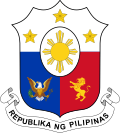 |
|---|
Executive departments are the largest component of the executive branch of the government of the Philippines. These departments comprise the largest part of the country's bureaucracy.
 |
|---|
Executive departments are the largest component of the executive branch of the government of the Philippines. These departments comprise the largest part of the country's bureaucracy.
All departments are listed by their present-day name with their English names on top and Filipino names at the other column. Department heads are listed at the Cabinet of the Philippines article.
The departments listed below are defunct agencies which have been abolished, integrated, reorganized or renamed into the existing executive departments of the Philippines.